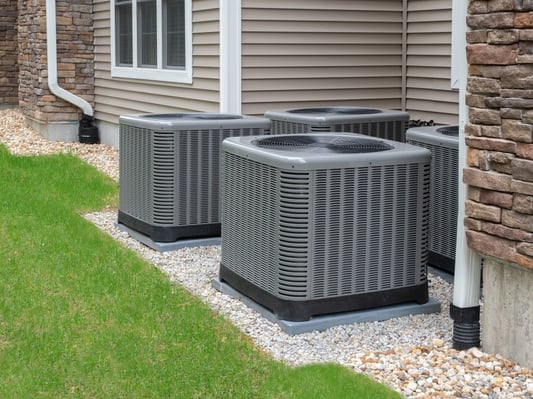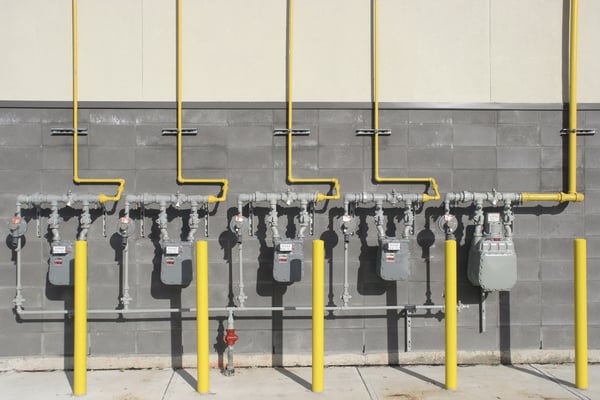Does Local Law 152 of 2016 Affect My Building?

Local Law 152 was created to reduce the risks associated with exposed gas piping while eliminating illegal connections and any conditions that don’t meet codes. In a few words, the law requires mandatory inspections for exposed gas piping at four-year intervals, and there are penalties for not delivering them on time.
To manage the LL152 compliance process more easily, the NYC Department of Buildings has classified buildings into four groups, based on their community districts. Each group is assigned a different year to submit the report, and the cycle repeats itself when all four groups of buildings have submitted their reports.
Make sure your building is compliant with Local Law 152 and avoid penalties.
The requirements of LL152 change depending on the type of building, including who must sign the report. This article will provide a quick guide on what to do in each case.
Occupancy Group R-3: Exempt from Local Law 152 of 2016
Buildings that are classified as occupancy R-3 are not subject to LL152/2016, which means there are no periodic reports or penalties involved. This group includes the following types of buildings:
- One- and two-family dwellings
- Convents and monasteries with less than 20 occupants
- Group homes
If your building belongs to occupancy group R-3, there is no need to worry about Local Law 152. Regardless of the gas piping used by the building, no inspection or notification is required. However, a professional inspection of the building and its installations is still recommended, since it can reveal potential ways to improve performance or safety.
Keep in mind that any gas piping work must be reviewed and approved by the NYC Dept. of Buildings, even if the building is not subject to LL152 of 2016. In the same year, the NYC DOB published Local Law 150, which only allows gas work to be performed by:
- A Licensed Master Plumber or LMP
- An individual with a gas work qualification as specified in LL150/2016, supervised by a Licensed Master Plumber.
- An individual with a limited gas work qualification as specified in LL150/2016, with personal or supervision by either of the previous two individuals.
It is important to note that the gas work qualification is permanent once achieved, but the limited gas work qualification must be renewed after five years.
LL152 Requirements for Buildings Without Gas Piping

Buildings without gas piping are a special case since they are subject to LL152 even when there is nothing to inspect. For example, these requirements would apply to a building that only uses electric heat pumps. These buildings are subject to the same reporting schedule as those with gas piping systems, with some important differences:
- Since there are no gas installations to inspect, LL152 does not require an Inspection Report form (GPS1)
- However, the building owner must submit an Inspection Certification form (GPS2), indicating there is no gas piping in the property.
- To be valid, the GPS2 form must be signed by a Registered Design Professional: a Registered Architect (RA) or Professional Engineer (PE).
- There is a $10,000 penalty for not delivering the form on time, according to the assigned deadlines for each building group.
In these cases, LL152 can be met without the services of a Licensed Master Plumber. However, if gas piping is added to the building at any time, it will then be subject to periodic inspections.
LL152 Requirements for Buildings With Gas Piping

In these buildings, the gas installations must be inspected by a Licensed Master Plumber, or a qualified individual according to NYC DOB rules, supervised by an LMP. In these cases, reports are delivered according to the following timeline:
- Inspection Report (GPS1) within 30 days of the inspection.
- Inspection Certification (GPS2) within 60 days.
- In buildings with conditions that must be fixed, another GPS2 within 120 days, indicates they have been corrected.
- If additional time for the corrections is requested, the second GPS2 form can be submitted in 180 days.
- All these documents must be signed by the Licensed Master Plumber in charge.
- The $10,000 penalty for non-compliance also applies in this case.
The LMP is under a legal obligation to notify unsafe conditions immediately, without waiting until the Inspection Report GPS1 form is complete. This requirement also applies to illegal connections and code violations.
The inspection must cover all exposed gas piping in the building, downstream from the main service connection. However, gas piping located inside private dwellings is exempt. Common areas, boiler rooms, and mechanical rooms must be tested with a portable combustible gas detector.
Conclusion
Depending on the type of building, the requirements of LL152/2016 can be an inspection and certification, a certification only, or none. If you are unsure about the specific requirements for your building, or the assigned dates to submit the inspection report, you can get a professional opinion.

Michael Tobias
Michael Tobias, the Founding Principal of NY Engineers, currently leads a team of 150+ MEP/FP engineers and has led over 4,000 projects in the US
Join 15,000+ Fellow Architects and Contractors
Get expert engineering tips straight to your inbox. Subscribe to the NY Engineers Blog below.

